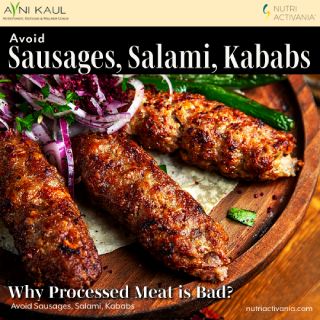Are you in love with meat? Undoubtedly, meat is one of the best protein sources, delivering a punch of nutrients such as iodine, iron, and zinc, along with a bouquet of B vitamins. However, as we revel in the succulence of sausages, the savoury notes of salamis, and the sizzle of kebabs, it is crucial to pause and consider the implications of processed meat on our health. Processed meat implies meat preserved through smoking, curing, salting, or with added preservatives, including ham, sausage, bacon, deli meats, hot dogs, jerky, pepperoni, and sauces. So, what do we do? Should we avoid having processed meat? Let us read about it in this blog from dietician Avni.

Why processed meat is bad for our health? Leading weight loss expert, nutritionist and dietician, Avni Kaul, explains:
Presence of Nitrates, Nitrites and Nitrosamines
Chemicals like nitrites and nitrates are used in processed meats to keep them fresh and prevent bacteria growth. These chemicals react with your body and can damage DNA, raising the risk of bowel cancer. Nitrites can turn into harmful compounds called nitrosamines when cooked with proteins at high temperatures, which are known to cause cancer. Sodium nitrite is added to processed meats to preserve color, improve flavor, and prevent bacteria growth. While nitrate, found in vegetables, can be beneficial, nitrites in processed meats are linked to cancer risk due to nitrosamine formation.
Chemical Haem can result in bowel cancer
Consumption of red and processed meat has been linked to an increased risk of large bowel cancer. Research indicates that haem, present in red meat, stimulates the production of N-nitroso compounds (NOCs) in the human intestine. When haem is broken down in the gut, these NOCs are formed, leading to damage in the bowel lining and a heightened risk of bowel cancer. The same harmful chemicals are also produced during the digestion of processed meat, which primarily consists of red meat varieties like beef, pork, and lamb. Haem, responsible for the color of red meat, triggers the formation of cancer-causing compounds that have been shown to harm the bowel lining. The extended duration that meat spends in various parts of the body, particularly in the colon, is suggested as a potential factor contributing to this process.
Polycyclic Aromatic Hydrocarbons (PAHs)
Smoking meat, an ancient preservation method often coupled with salting or drying, produces potentially harmful substances, such as polycyclic aromatic hydrocarbons (PAHs). Formed during organic matter combustion, PAHs transfer into air with smoke, accumulating on smoked or grilled meat surfaces. Derived from burning wood, fat drippings, or charred meat, PAHs in smoked products pose health risks. Animal studies reveal PAH-induced carcinogenicity, as ingested PAHs can convert to carcinogenic PAH-diol epoxides, binding DNA, disrupting gene transcription, and causing genotoxic, mutagenic, and carcinogenic effects.
Heterocyclic amines (HCAs)
A class of chemical compounds called Heterocyclic amines (HCAs) are formed when meat or fish are cooked at high temperatures. This is when amino acids (the building blocks of proteins), sugars, and creatine or creatinine (substances found in muscle) react at high temperatures. For instance, well-done meats like grilled steak and chicken, sausages, and fried bacon contain a high amount of HCAs. High HCA consumption has been linked to cancer in animals, with observational studies suggesting increased risks for colon, breast, and prostate cancer in humans. Gentle cooking methods like low-heat frying and steaming can reduce HCA levels, while charred or blackened meat should be avoided.
High Salt Content
Salt, as we know, has been used as a preservative since time immemorial and is also required for the normal functioning of the body. However, the high content of sodium chloride or table salt present in processed meat is harmful to your health. Excessive intake of sodium is a risk factor for hypertension, also known as high blood pressure, which increases your risk of heart failure. According to studies, a high-salt diet increases the risk of stomach cancer.
Saturated fat
Processed meat contains a high amount of saturated fat which is not only unhealthy but also leads to obesity. So, we learned today about the detrimental effects of processed meat on our health, from cancer-causing chemicals to high levels of sodium and saturated fats. Making informed dietary choices can significantly reduce these risks and promote overall well-being.
- Amazing Indian Foods to Lower Your Blood Pressure Level Naturally - April 26, 2024
- Fruits That Can Help You Lose (or Maintain Your) Weight - April 23, 2024
- What are the Potential Health Benefits of Raw Sprouts? - April 20, 2024
